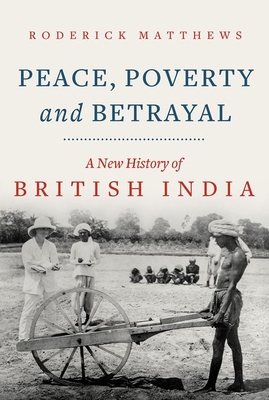Peace, Poverty and Betrayal: A New History of British India

Peace, Poverty and Betrayal: A New History of British India
How can we explain the establishment and longevity of British rule in India without recourse to the clich�s of imperial versus nationalist interpretations? In this new history, Roderick Matthews offers a more nuanced view: one of oblige and rule, the foundation of common purpose between colonizers and powerful Indians. Peace, Poverty and Betrayal argues that this was not a uniformly systematic approach, but rather a state of being: the British were never clear or consistent in their policies, and among British and Indians alike there were both progressive and conservative attitudes to the struggle over colonization. Matthews' narrative also takes in the East India Company, which was manifestly incompetent as a ruler by 1770, yet after 1820 arguably became the world's first liberal government. Skillfully tying these ambiguities and complexities of British rule in India to the ultimate struggle for independence, Matthews illustrates that the very diversity of British- Indian relations was at the heart of the social changes that would lead to the Freedom Struggle of the twentieth century. Skewering the simplistic binaries that often dominate the debate, Peace, Poverty and Betrayal is a fresh and gracefully written narrative history of British India.
How can we explain the establishment and longevity of British rule in India without recourse to the clich�s of "imperial" versus "nationalist" interpretations? In this new history, Roderick Matthews offers a more nuanced view: one of "oblige and rule", the foundation of common purpose between
colonizers and powerful Indians. Peace, Poverty and Betrayal argues that this was not a uniformly systematic approach, but rather a state of being: the British were never clear or consistent in their policies, and among British and Indians alike there were both progressive and conservative attitudes to the struggle over
colonization. Matthews' narrative also takes in the East India Company, which was manifestly incompetent as a ruler by 1770, yet after 1820 arguably became the world's first liberal government. Skillfully tying these ambiguities and complexities of British rule in India to the ultimate struggle for
independence, Matthews illustrates that the very diversity of British- Indian relations was at the heart of the social changes that would lead to the Freedom Struggle of the twentieth century. Skewering the simplistic binaries that often dominate the debate, Peace, Poverty and Betra
252.81Lei
252.81Lei
Livrare in 2-4 saptamani
Descrierea produsului
How can we explain the establishment and longevity of British rule in India without recourse to the clich�s of imperial versus nationalist interpretations? In this new history, Roderick Matthews offers a more nuanced view: one of oblige and rule, the foundation of common purpose between colonizers and powerful Indians. Peace, Poverty and Betrayal argues that this was not a uniformly systematic approach, but rather a state of being: the British were never clear or consistent in their policies, and among British and Indians alike there were both progressive and conservative attitudes to the struggle over colonization. Matthews' narrative also takes in the East India Company, which was manifestly incompetent as a ruler by 1770, yet after 1820 arguably became the world's first liberal government. Skillfully tying these ambiguities and complexities of British rule in India to the ultimate struggle for independence, Matthews illustrates that the very diversity of British- Indian relations was at the heart of the social changes that would lead to the Freedom Struggle of the twentieth century. Skewering the simplistic binaries that often dominate the debate, Peace, Poverty and Betrayal is a fresh and gracefully written narrative history of British India.
How can we explain the establishment and longevity of British rule in India without recourse to the clich�s of "imperial" versus "nationalist" interpretations? In this new history, Roderick Matthews offers a more nuanced view: one of "oblige and rule", the foundation of common purpose between
colonizers and powerful Indians. Peace, Poverty and Betrayal argues that this was not a uniformly systematic approach, but rather a state of being: the British were never clear or consistent in their policies, and among British and Indians alike there were both progressive and conservative attitudes to the struggle over
colonization. Matthews' narrative also takes in the East India Company, which was manifestly incompetent as a ruler by 1770, yet after 1820 arguably became the world's first liberal government. Skillfully tying these ambiguities and complexities of British rule in India to the ultimate struggle for
independence, Matthews illustrates that the very diversity of British- Indian relations was at the heart of the social changes that would lead to the Freedom Struggle of the twentieth century. Skewering the simplistic binaries that often dominate the debate, Peace, Poverty and Betra
Detaliile produsului










